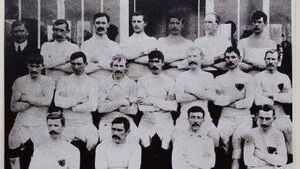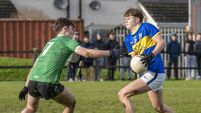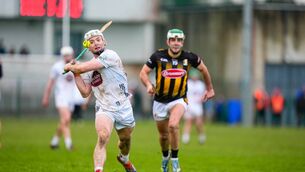Cawley following in some illustrious footsteps

Jack Fitzgerald, second from the right in the middle row, with the 1905 All-Ireland winning Kildare team
On Sunday, Newbridge man Brendan Cawley follows in the footsteps of only six previous Kildaremen in refereeing an All Ireland Senior Football Final.
Another Droichead Nua native John ‘Jack’ Fitzgerald was the first and, as we’ll come to, arguably the most fascinating. The Roseberry clubman refereed the 1906 and 1907 finals. He was followed by Peter Waters (1938 replay), Seamus Burke (1940), Seamus Aldridge, who handled the famous Dublin-Kerry 1978 decider, and more recently Tommy Howard (1993) and Mick Monahan (2005).
Waters and Aldridge both had to contend with controversies on their big days. Raheens man Waters, who had played in the 1935 final with the Lilywhites and was still actively lining out at inter-county level, whistled for a free towards the end of the Kerry v Galway replay and many within the ground, including at least nine Kerry players, who went back to their hotel, assumed it was the final whistle.
Eventually the game restarted, with Kerry using nine substitutes, some of whom had not been named on the match day panel. Galway, who were leading when the confusion arose by three points, went on to win by the same margin.
Exactly forty years later former Round Towers and Kildare player and eminent Kildare GAA official Aldridge was the man who awarded that controversial free against a bewildered Dublin and Mikey Sheehy quick-as-a-flash chipped gobsmacked goalkeeper Paddy Cullen for the “greatest freak of all time,” as commentator Micheal Ó Hehir described it, though I prefer Con Houlihan’s description of Cullen dashing back “towards his goal like a woman who smells a cake burning.” But back to Fitzgerald and if Waters’ feat of taking charge of a final while still a player seems remarkable (it was actually reasonably common in those days; many Kildare County Finals were handled by active club players), Fitzgerald’s is incredible.
From Eyre Street in Newbridge, Fitzgerald was only twenty when his father, also John, a shoemaker, passed away at the age of fifty. Between various spells working in England, the younger Jack became a goalkeeper with the all-conquering Roseberry club of the early 1900’s and made his championship debut with Kildare against Dublin in 1904 (the delayed 1903 championship).
Fitzgerald went on to play in the three-game 1903 All Ireland final against Kerry, which eventually concluded with a Kerry win in October 1905 and two years later in June 1907 Kildare would secure their first ever national title when Fitzgerald was between the sticks for the (delayed again) 1905 decider against the Kingdom. Younger brother Mick “Gundy” was also on that team.
By this time Fitzgerald was considered the best goalkeeper in the country but he was also well regarded in administrative affairs, and he was Leinster GAA Chairman from 1905 to 1908.
As if that wasn’t enough to keep him out of mischief, Jack was also a renowned, “tough but fair” referee and when the 1906 All Ireland Final between Cork and Mayo was fixed for Athy on 20 October 1907, he was the natural appointee to take the whistle.
Remember, only four months earlier, he was keeping goal for Kildare in the 1905 equivalent!
As if that wasn’t enough Fitzgerald was back in the middle for the 1907 final, played, if you can keep up with the chronology, on 5 July 1908 (Dublin v Cork).
Surely it must be a unique achievement for a man to play an active part in three different years’ All Ireland Senior Football Finals in the space of less than thirteen months!
Another spell in England ensued after that (perhaps he needed a rest!) but in 1913 the records show him back playing in goal for both Roseberry and Kildare, though the Leinster Quarter Final against Dublin that year appears to have brought down the curtain on his county career.
He was far from idle, of course. At the annual convention held in Newbridge Town Hall that year, Jack was elected Chairman of Kildare GAA for the first time.
A bootmaker at the Curragh Camp, he became involved in other pertinent matters around the same time, having joined the Irish Volunteers, and JJ Morrin of Caragh took over as County Board Chairman the following year.
Jack had further spells in England but was elected again as Kildare Chairman in March 1916. A month later of course the Easter Rising began, although the details of Fitzgerald’s involvement are a little sketchy.
What we do know is that he was arrested at the end of Easter Week and deported in May to Wakefield Jail, spending over a month there.
He was later involved with Sinn Féin and served on Newbridge Town Commission and Kildare County Council before being arrested again in 1920 and transferred to Ballykinlar Internment Camp in Co. Down. He joined the National Army and became OC of Naas Barracks in 1922, eventually retiring as a Commandant.
A staunch Gael, he certainly lived a fascinating life, on and off the field, before passing away aged 75 at his Eyre Street residence in 1950. Hopefully Brendan Cawley will have a slightly quieter time of it after his big day on Sunday!





